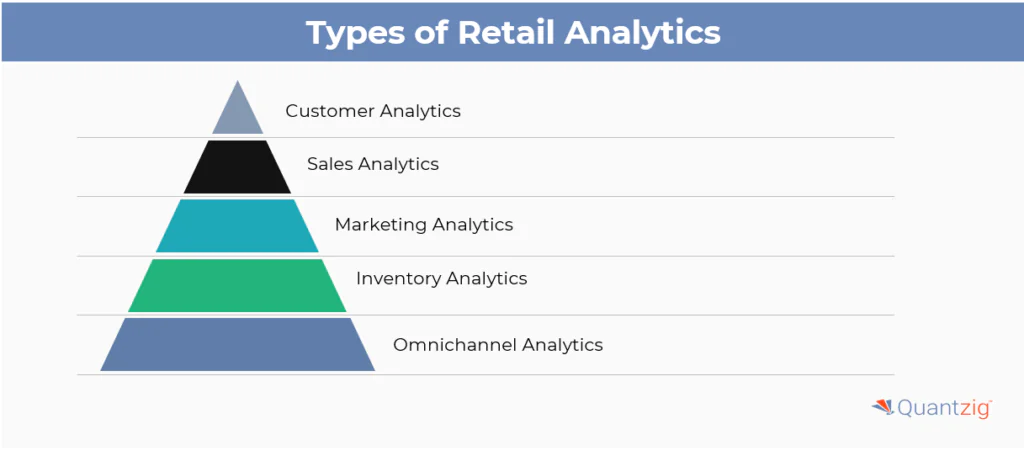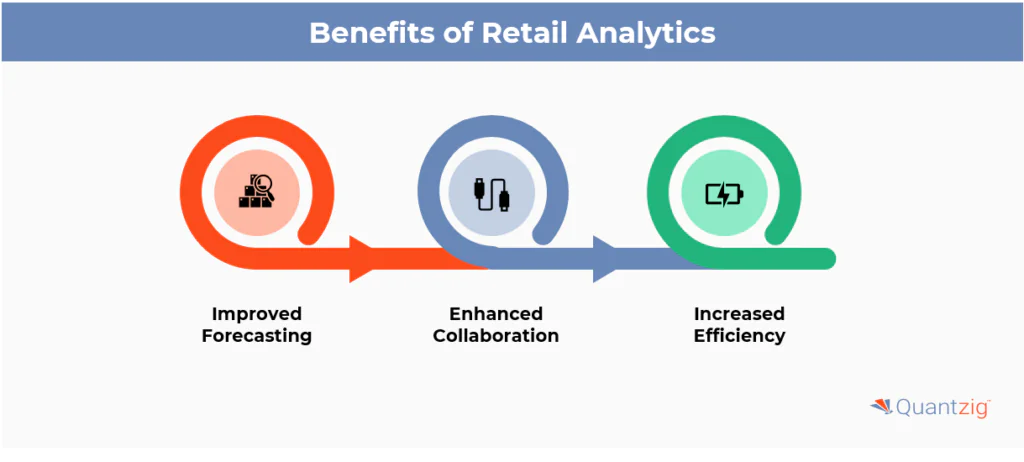Written by: Medha Banerjee
Retail analytics has become a crucial tool for retailers and suppliers to stay competitive in today’s fast-paced and data-driven market. By leveraging advanced analytics solutions, businesses can gain valuable insights into customer behavior, optimize their strategies, and increase profitability. In this blog, we will explore the world of retail analytics, its benefits, and how it can revolutionize the retail industry.
Table of Contents
What is Retail Analytics?
Retail analytics or Retail Intelligence Solutions is the process of collecting, analyzing, and interpreting data to gain insights into customer behavior, sales patterns, and market trends. It involves the use of advanced statistical models and machine learning algorithms to identify patterns and make predictions about future sales, customer preferences, and market conditions. Retail analytics can be applied to various aspects of retail operations like Retail Media Analytics, including customer segmentation, sales forecasting, inventory management, and promotion optimization.
Book a demo to experience the meaningful insights we derive from data through our analytical tools and platform capabilities. Schedule a demo today!
Request a Free Demo4 Reasons to Use Retail Analytics
Retail analytics offers numerous benefits to retailers and suppliers. By using data-driven insights, businesses can:
- Improve Customer Experience: Retail analytics helps identify customer preferences, allowing retailers to tailor their offerings and improve customer satisfaction.
- Optimize Operations: By analyzing sales patterns and inventory levels, retailers can optimize their supply chain and reduce waste.
- Increase Efficiency: Retail analytics enables retailers to streamline their operations, reducing costs and improving productivity.
- Enhance Decision-Making: Data-driven insights empower retailers to make informed decisions about pricing, promotions, and product offerings.
5 Types of Retail Analytics
Retail analytics can be broadly categorized into several types, each focusing on specific aspects of retail operations:

- Customer Analytics: Analyzes customer behavior, preferences, and demographics to identify segments and tailor marketing strategies.
- Sales Analytics: Examines sales patterns, trends, and seasonality to forecast future sales and optimize inventory levels.
- Marketing Analytics: Analyzes the effectiveness of marketing campaigns, including promotions, pricing, and product offerings.
- Inventory Analytics: Optimizes inventory levels and supply chain management to reduce waste and improve efficiency.
- Omnichannel Analytics: Analyzes customer behavior across multiple channels, including online and offline platforms.
How Can I Use Retail Analytics?
Retail analytics can be applied to various aspects of retail operations, including:

- Customer Segmentation: Identifies distinct customer groups based on demographics, behavior, and preferences.
- Customer Lifetime Value (CLTV): Calculates the total value a customer is expected to bring to a business over their lifetime.
- Basket Analysis: Analyzes the items customers purchase together to identify trends and opportunities for cross-selling.
- Market Basket Analysis: Examines the items customers purchase in a single shopping trip to identify patterns and trends.
- Promotion Optimization: Analyzes the effectiveness of promotions and pricing strategies to optimize sales and revenue.
- Pricing Optimization: Analyzes market trends and customer behavior to optimize pricing strategies.
- Sales Forecasting: Predicts future sales based on historical data and trends.
- Demand Forecasting: Predicts future demand for products based on historical data and trends.
- Inventory Management: Optimizes inventory levels and supply chain management to reduce waste and improve efficiency.
The Benefits of Retail Analytics for Suppliers
Retail analytics offers several benefits to suppliers, including:
- Improved Forecasting: Suppliers can use retail analytics to predict future demand and optimize their production and inventory levels.
- Enhanced Collaboration: Suppliers can work closely with retailers to develop targeted marketing campaigns and optimize product offerings.
- Increased Efficiency: Suppliers can streamline their operations and reduce costs by optimizing their supply chain and inventory management.
The Benefits of Retail Analytics to Retailers
Retail analytics offers numerous benefits to retailers, including:
- Improved Customer Experience: Retail analytics helps retailers tailor their offerings to customer preferences, improving customer satisfaction.
- Optimized Operations: Retail analytics enables retailers to streamline their operations, reducing costs and improving productivity.
- Increased Efficiency: Retail analytics helps retailers optimize their inventory levels and supply chain management, reducing waste and improving efficiency.
- Enhanced Decision-Making: Data-driven insights empower retailers to make informed decisions about pricing, promotions, and product offerings.
Optimise Retail Strategies With Advanced Retail Analytics
Retail analytics is a powerful tool for optimizing retail strategies. By leveraging advanced analytics solutions, retailers can:
- Improve Customer Experience: Retail analytics helps retailers tailor their offerings to customer preferences, improving customer satisfaction.
- Optimize Operations: Retail analytics enables retailers to streamline their operations, reducing costs and improving productivity.
- Increase Efficiency: Retail analytics helps retailers optimize their inventory levels and supply chain management, reducing waste and improving efficiency.
Increase Profits With Retail Analytics
Retail analytics can help retailers increase profits by:
- Optimizing Pricing: Retail analytics helps retailers optimize their pricing strategies based on market trends and customer behavior.
- Improving Inventory Management: Retail analytics enables retailers to optimize their inventory levels and supply chain management, reducing waste and improving efficiency.
- Enhancing Customer Experience: Retail analytics helps retailers tailor their offerings to customer preferences, improving customer satisfaction and loyalty.
Also read : Optimizing Retail Operations with a Low-Code Risk Management Monitoring Tool
How Can You Benefit From Modern Retail Analytics?
Modern retail analytics offers numerous benefits to retailers and suppliers, including:

- Improved Customer Experience: Retail analytics helps retailers tailor their offerings to customer preferences, improving customer satisfaction.
- Optimized Operations: Retail analytics enables retailers to streamline their operations, reducing costs and improving productivity.
- Increased Efficiency: Retail analytics helps retailers optimize their inventory levels and supply chain management, reducing waste and improving efficiency.
- Enhanced Decision-Making: Data-driven insights empower retailers to make informed decisions about pricing, promotions, and product offerings.
In a nutshell, retail analytics is a powerful tool for retailers and suppliers to stay competitive in today’s fast-paced and data-driven market. By leveraging advanced analytics solutions, businesses can gain valuable insights into customer behavior, optimize their strategies, and increase profitability. Whether you are a retailer or supplier, retail analytics can help you optimize your operations, improve customer experience, and increase efficiency.
Experience the advantages firsthand by testing a customized complimentary pilot designed to address your specific requirements. Pilot studies are non-committal in nature.
Request a Free PilotThe Importance of Retail Analytics for CPGs and Retailers
CPGs (Consumer Packaged Goods) and retailers are constantly facing intense competition and rapidly changing market dynamics. To stay ahead, they need to have a deep understanding of their customers’ needs and preferences, and optimize their product portfolio, pricing, promotions, and store execution strategies accordingly. This is where retail analytics like predictive analytics plays a crucial role.
Optimizing Product Portfolio, Pricing, and Promotions
Analytics helps CPGs and retailers determine the optimal product mix for their stores, considering factors like seasonality, local preferences, and sales trends. This ensures that they are offering products that customers are actively looking for, thereby improving customer satisfaction and driving sales.
By analyzing customer behavior and competitor pricing, businesses can set optimal prices that maximize sales and profitability. This might involve implementing dynamic pricing strategies based on demand or offering personalized discounts to specific customer segments.
Additionally, retail analytics helps in analyzing the effectiveness of promotional campaigns and identifying the best channels, discounts, and timing to maximize return on investment (ROI). This allows businesses to optimize their promotional strategies and allocate their marketing budgets more effectively.
Ensuring Effective Store Execution and Compliance
Often, well-crafted and data-driven strategies are easier to identify and plan for, but they can fall short in implementation and sustained execution compliance. This makes it difficult to measure the actual impact and program success.
Retail data often resides in separate systems like point-of-sale (POS), customer relationship management (CRM), and loyalty program software. Integrating data from these silos into a unified platform for analysis can be complex and time-consuming.
Moreover, inaccurate or incomplete data due to human error, system inconsistencies, or lack of data cleaning procedures can lead to misleading or unreliable insights from your analytics.
Unlocking the Power of Retail Analytics with Quantzig
Quantzig, a leading analytics service provider, offers comprehensive solutions to help CPGs and retailers overcome these challenges and unlock the full potential of retail analytics.
Ensuring Pricing, Promotion, and Execution Compliance
Quantzig supports clients with unique sales execution frameworks that assure pricing, promotion, stock, and shelf space compliance through virtual sales force execution. This helps businesses maintain consistent execution across their retail network, ensuring that their strategies are implemented effectively and their investments yield the desired results.
Optimizing Product Assortment and Promotions
Quantzig also helps clients with tailored strategies for product and assortment optimization in both offline and online setups. This includes optimizing product promotions and customer contextualizations, supporting various aspects of execution from new release management, upsell/cross-sell planning, stock clearance, and product dilution.
By leveraging advanced analytics and data integration capabilities, Quantzig enables CPGs and retailers to make informed decisions, optimize their operations, and stay ahead of the competition.
Get started with your complimentary trial today and delve into our platform without any obligations. Explore our wide range of customized, consumption driven analytical solutions services built across the analytical maturity levels.
Start your Free Trial TodayConclusion
In today’s dynamic retail landscape, the power of retail analytics cannot be overstated. By leveraging data-driven insights, CPGs and retailers can optimize their product portfolio, pricing, promotions, and store execution strategies, ultimately driving customer engagement, footfall, and conversions – and ultimately, higher ROI.
Quantzig’s comprehensive retail analytics solutions empower businesses to overcome the challenges of data silos, inconsistent data, and ineffective execution, enabling them to unlock the full potential of their retail strategies and stay ahead of the competition.



